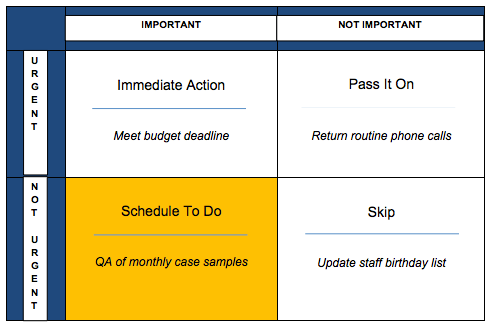Hi. We’re Sherry Campanelli, Program Compliance Manager and Laura Newhall, Clinical Training Coordinator, from the University of Massachusetts Medical School’s Disability Evaluation Services (DES). As an organization, we are committed to ongoing quality improvement (QI) efforts to enhance our services for people with disabilities especially during times of major change or crisis. It hit home recently when a blog by Sheila Robinson identified a topic that AEA365 readers were interested in and something we’ve struggled with ourselves: “how to incorporate evaluation when there’s a myriad of other seemingly more pressing tasks without pushing it to the back burner.”
When an organization is in a time of crisis (high staff turnover, new business processes, or increased work load), it’s difficult to maintain QI efforts and evaluation. There will be pressure to suspend or reduce internal evaluations in favor of more urgent tasks. Evaluation is always important, but rarely urgent. So how do we preserve a commitment to evaluation during these times?
Developed by the 34th U.S. president, the Eisenhower Box is one effective approach for addressing this challenge. It’s a systematic method to assure that reacting to urgent demands doesn’t prevent important tasks from being accomplished. It categorizes tasks along two axes and four quadrants based on degree of importance and urgency. The figure below demonstrates how the Eisenhower Box is used to prioritize and address work demands.
The Eisenhower Box:
The key to preserving on-going evaluation efforts is to schedule time to perform activities while resisting the temptation to address only urgent demands. The danger of not prioritizing “important but not urgent” tasks is that you will either fail to accomplish the tasks or not finish them in a timely manner. Completing all important tasks, whether urgent or not, is critical to organizations creating forward motion.
Lessons Learned:
Here are some lessons learned on how to best integrate evaluation into the myriad of pressing tasks without pushing it to the back burner.
- Remind staff of the organization’s commitment to QI and how it’s been helpful in the past.
- Resist temptation to suspend evaluation in the name of efficiency or “getting more done”.
- Support staff to remain engaged in evaluation activities by assisting them with time management skills; keep the focus away from unimportant tasks.
- Maintain key components of your evaluation structure (e.g., maintaining a valid sample size).
- Look for efficiencies in the “unimportant and not urgent” areas of your organization’s processes.
Thoughts to Ponder:
“What is important is seldom urgent, and what is urgent is seldom important.” – Dwight Eisenhower
Rad Resources:
“How to be More Productive and Eliminate Time Wasting Activities by Using the “Eisenhower box” by James Clear.
“Urgent vs. Important” by Hamza Khan.
Do you have questions, concerns, kudos, or content to extend this aea365 contribution? Please add them in the comments section for this post on the aea365 webpage so that we may enrich our community of practice. Would you like to submit an aea365 Tip? Please send a note of interest to aea365@eval.org . aea365 is sponsored by the American Evaluation Association and provides a Tip-a-Day by and for evaluators.

